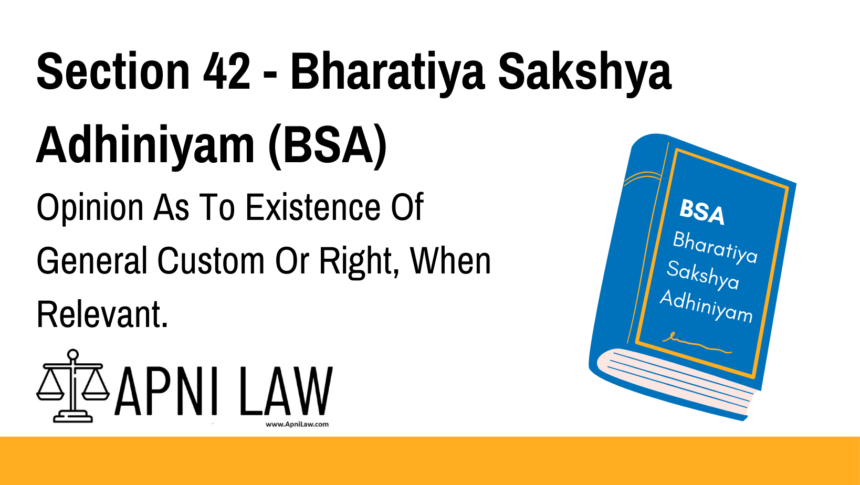Code: Section 42 of Bharatiya Sakshya Adhiniyam (BSA)
When the Court has to form an opinion as to the existence of any general custom
or right, the opinions, as to the existence of such custom or right, of persons who would be
likely to know of its existence if it existed, are relevant.
Explanation.—The expression “general custom or right” includes customs or rights
common to any considerable class of persons.
Illustration.
The right of the villagers of a particular village to use the water of a particular well is
a general right within the meaning of this section.
Explanation of Section 42 BSA
Section 42 of the Bharatiya Sakshya Adhiniyam (BSA) deals with the admissibility of opinions regarding the existence of general customs or rights. When a legal dispute arises and the Court must determine whether a particular custom or communal right exists, it can consider the opinions of individuals who are reasonably expected to know about such customs or rights.
This provision is particularly important in contexts where customs or rights are based on tradition or local practices and may not be formally documented.
What is a “General Custom or Right”?
According to the Explanation in Section 42, a “general custom or right” refers to customs or rights that are shared by a large or identifiable group of people—such as villagers, members of a caste or tribe, or residents of a locality. These may include:
-
Customary rights to water, grazing, or passage
-
Communal religious or festival practices
-
Trade or occupational customs among a guild or class
Illustration
Let’s say there is a legal question about whether villagers in a certain area have the right to draw water from a well located on private land. Under Section 42, the court can take into account the opinions of elder villagers, local leaders, or other community members who have lived in the village for a long time and are familiar with traditional practices. Their opinions help establish whether the alleged right actually exists and is recognized as a general custom.
Common Questions and Answers on Section 42 BSA
Q1. What qualifies as a “general custom or right” under this section?
It refers to customs or rights that are widely followed or acknowledged by a considerable class of people, such as villagers, a religious community, or a professional group.
Q2. Who can give relevant opinions under Section 42?
Individuals who are likely to know about the existence of the custom or right due to their experience, social role, or long-term association with the group.
Q3. Is documentary evidence necessary to prove such customs?
Not necessarily. Oral testimony and opinions can be sufficient, especially when the custom is traditional and undocumented.
Q4. Can opinions under Section 42 be challenged in court?
Yes, the other party can cross-examine the witnesses or present contrary evidence to dispute the claimed custom or right.
Conclusion
Section 42 of the Bharatiya Sakshya Adhiniyam plays a vital role in legal proceedings involving unwritten rights and long-standing customs. It allows courts to consider community knowledge and lived experience when deciding such matters. This section is essential for preserving the relevance of traditional practices within the modern legal system.
For more in-depth legal explanations and bare act analysis, explore more sections on ApniLaw.








